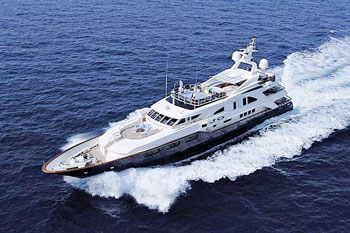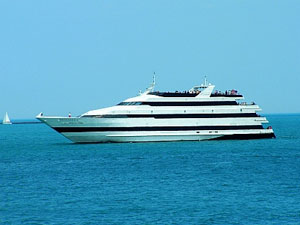
The benefits of leaving the United Kingdom and becoming an expatriate have long been extolled, and with the UK in a grip of economic malaise, becoming an expatriate has never been more popular.
However, some may think that at becoming an expat is only for suit and tie individuals, and that an expatriate life goes hand in hand with board meetings and stock markets, but this couldn’t be further from the truth.
If you are somebody who is career minded, and want to embark on an international adventure that will give you long term rewards both financially and personally then there is an option you may not have considered- working on a yacht.
Benefits of yachting life
Working on a yacht, becoming a yacht crew member, gives you a life far removed from the confines of an office, a life that will have fantastic career options, lots of travel, and the opportunity to meet new people.
Working on a yacht comes with the following benefits:
Highly competitive salary
Large scope for career advancement
Full accommodation
Six weeks+ paid holiday
Global travel opportunities
Yacht crew banking options
Tax benefits
Opportunity to save
What is a Super Yacht?
A Super Yacht is a vast, sprawling and majestic yacht primarily used by extremely wealthy people. By definition a Super Yacht is a cruising craft powered either by sails or a motor, which exceeds 24m in length. Of course, maintaining a vessel of such magnitude requires a number of crew, and that's where you come in.
Yacht Crew Roles
The roles that need to be filled on Super Yachts include: deckhands, stewards, chefs, mates/officers, engineers and the captain.
Deckhand
The position of deckhand is the entry level role for people seeking employment aboard a yacht. A sailing qualification is not essential but will always come in handy. A deckhand could be required to do maintenance work including painting and carpentry, and other jobs to assist the operation of the boat.
A good deckhand will be trained with the following skills and certificates- STCW 95 Basic Training; RYA / MCA Personal Survival Techniques, MCA Fire Prevention and Fire Fighting, MCA Elementary First Aid, MCA Personal Safety and Social Responsibility.
Steward
A steward or stewardess is mainly in charge of looking after the boat, similar to a caretaker. In many cases there will be a chief steward who will work with a number of assistant stewards. The steward will mainly be required to clean the boat, keep decorations fresh, and also to supply refreshments to both the crew and the guests, along with other aspects of catering.
Stewards will also be trained with STCW 95 Basic Training; RYA / MCA Personal Survival Techniques, MCA Fire Prevention and Fire Fighting, MCA Elementary First Aid MCA Personal Safety and Social Responsibility.
Chef
The chef’s role will be to cook food for the crew and the guests. In terms of qualifications, experience will be the benchmark and a good history of creating wonderful dishes will be essential. Chefs will also be required to have the relevant health and hygiene certificates.
First Mate
The role of first mate is very important. You will be the captain's right hand, and will be in charge of the deckhands and other exterior crew members. An extensive background Crewing will be necessary as will a number of qualifications including STCW 95 Basic Training, Yacht Rating, Master 200gt, Yachtmaster Theory, Yachtmaster Practical, Sea Survival, GMDSS GOC, Navigation Radar, General Ships Knowledge, Oral Preparation, Oceanmaster Theory, Advanced Firefighting, Medical First Aid, Oceanmaster Cert Comp.
Engineer
An engineer on a boat is a highly sought after and well paid job, in some cases an engineer can earn even more than a captain.
The engineer will manage the inner workings of the boat, and ensure all the mechanics are running smoothly. There are a number of professional qualifications that an engineer must have by law and these include STCW 95 Basic Training, Yacht Rating, AEC, MEOL Engineer Yacht 4, Skills Test, Marine Diesel Engineering, Operational Procedures & Basic Hotel Services, Auxiliary Equipment & Basic Ship Construction, MCA Sea Survival for Yachtsman, Advanced Fire Fighting, Proficiency in Medical First Aid, Chief Engineer Statutory & Operational Requirements, Marine Engine Theory, Applied Marine Engineering.
Captain
The captain of the ship is the boss, everyone on the boat answers to him. A Yacht captain can earn up to £500,000. To become a captain one must have considerable experience working on boats, considerable training and a number of qualifications including STCW 95 Basic Training, Yacht Rating, Master 200gt, Yachtmaster Theory, Yachtmaster Practical, Sea Survival, GMDSS GOC, Navigation Radar, General Ships Knowledge, Oral Preparation, Navigation and Radar, Stability, Medical Care, Business and Law, Seamanship, Oral Preparation (500T), Oceanmaster Theory, Advanced Firefighting, Medical First Aid, Oceanmaster Cert.
The captain must also be very skilled with people, as he will have to deal with his crew, and the guests of the boat, who in many cases will be powerful people used to an exquisite level of service. The captain will also be in charge of the yacht's money, so good numeracy is essential.
Finances of a yacht crew member
Tax
A key point of expatriation for many people is avoiding the often harsh tax regimes that are prevalent in their original country, something that is certainly the case in the United Kingdom. Working on a boat is no different, as a yacht crew member you can benefit from offshore tax regimes, to gain a clearer picture you should consult an IFA.
Financial benefits
Financially, as a member of a yacht crew you’ll be in an interesting position, and there are many options available to you that would elude even other expats, let alone regular resident nationals.
First of all, as you will no longer be working in the UK you will be able to utilise offshore banking and potentially receive a number of financial benefits in the process.
In fact, an offshore bank account should be one of the first things you look into when taking on a maritime role. Travelling across the seas and having just a standard UK bank account is not an ideal situation. With an offshore account you won’t be tied to sterling, you will be able to bank in multiple currencies, which will be especially useful if you are paid in one currency, and spend in various ports in various currencies.
As a crew member you may also have a fantastic opportunity to save more money than if you were working onshore. Working on a boat you will have few expenses, in most cases you will live on the boat with no rent and your meals will also be provided, this allows you to place a large bulk of your savings away. This factor is one of the reasons why working on a yacht can be such a financially appealing prospect, it is not uncommon for yacht workers to establish savings plans that will allow them to retire more comfortably, and earlier, than those working on land.
By working in unison with an independent financial adviser who has experience with the maritime industry and yacht crew finances you will be able to work out a savings plan based on your income, personal situation and eventual aims.
Investment
Utilising offshore banking will also open up a world of investment opportunities, often when banking on shore you are limited to the financial products on offer at your high street bank, however when you leave the high street you open doors to a lot more investment, and once again an IFA will be able to help you scour the market and find the type of products that will be good for you.

Residency
An important factor to consider when becoming any kind of expat is residency, and this is the same for yacht crew members. Leaving the United Kingdom to work and becoming a non-resident will enable you to legally avoid UK taxes. However, becoming a non-resident is not always as easy as you may think. To truly be a non resident you will have to cut all ties with the UK, and that includes things like mobile phones and properties. Learn more about residency matters here.
Seafarer's Earnings Deduction
If you cannot become a non-resident at the current time due to existing ties you may still be able to claim back all tax paid via HMRC's Seafarer's Earnings Deduction scheme (SED). To qualify you will first have to spend 365 days out of the UK, you must have employment on board a ship, and your employment needs to include a minimum of one voyage or part voyage that starts or ends at a foreign port. You will have to claim via HMRC's self-assessment form, but you’ll need specialist help with this.
More help
There are other factors that will affect your finances when working on a boat, you may initially find that you have trouble with setting up an account since you will not have a fixed land address, however an independent financial advisor will able to help you clear things up and find the right account. Get in touch with a recommended IFA today.

